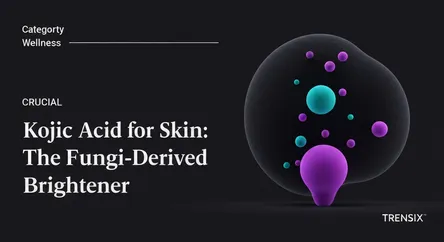Wellness
Kojic Acid for Skin: The Fungi-Derived Brightener

Discover kojic acid, a natural ingredient derived from fungi, known for its ability to lighten dark spots, even skin tone, and treat hyperpigmentation.
What is it?
Kojic acid is a natural compound produced by several species of fungi, and it's also a byproduct of the fermentation process of certain foods like Japanese sake and soy sauce. In skincare, it is renowned as a skin-lightening agent. It works by inhibiting the formation of tyrosine, an amino acid that is necessary to produce melanin, the pigment that gives color to skin, hair, and eyes. By blocking melanin production, kojic acid helps to lighten visible sun damage, age spots, and scars. It can be found in various cosmetic products such as serums, creams, cleansers, and soaps, typically in concentrations of 1% or less.
Why is it trending?
Kojic acid's popularity is soaring due to its effectiveness in treating various forms of hyperpigmentation. It is sought after for its ability to reduce the appearance of dark spots, melasma (darkening of the skin often caused by pregnancy), and post-inflammatory hyperpigmentation from acne. Beyond its skin-lightening capabilities, kojic acid also possesses antimicrobial and antifungal properties. This makes it a multi-functional ingredient that can help treat acne caused by bacteria and prevent certain fungal infections. Its ability to fade scars and provide an anti-aging effect by improving the appearance of age spots further boosts its appeal in the beauty community.
How does it affect people?
For most people, kojic acid is a safe and effective way to achieve a more even skin tone. By decreasing melanin production, it can visibly lighten darkened areas of the skin, leading to a brighter complexion. However, some individuals, especially those with sensitive skin, may experience side effects. The most common is contact dermatitis, which can manifest as redness, irritation, itchiness, or rashes. A significant consideration is that long-term use can make the skin more susceptible to sunburn because melanin helps protect against UV damage. Therefore, daily use of sunscreen is crucial when using products containing kojic acid. It should never be applied to broken or damaged skin.